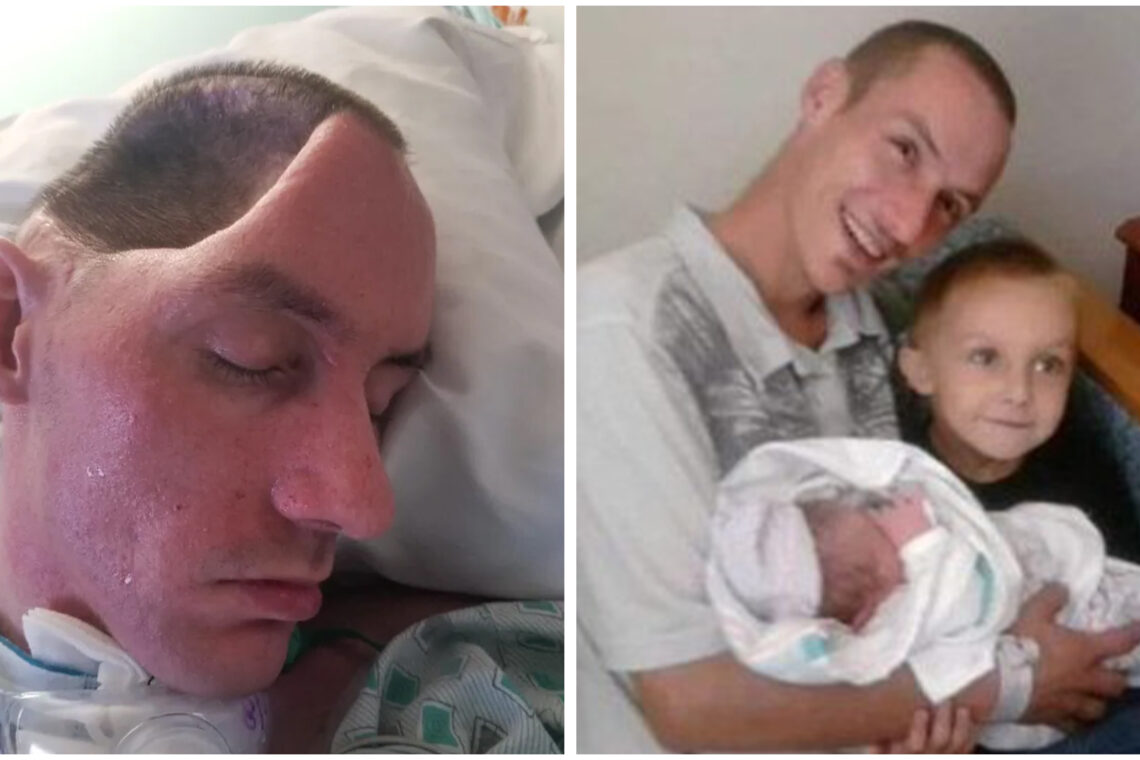
In an ideal world, the notion of fairness would be unwavering, where benevolence is rewarded, and those who cause harm are held accountable for their actions. However, the reality often paints a different picture, revealing a justice system that sometimes fails to uphold these principles.
A deeply troubling incident unfolded in New York City, where a father of two has been left grappling with severe injuries after a brutal attack. The victim, 32-year-old Steven Augustine, was assaulted in May 2018, suffering from a horrific assault that left him with a “sunken brain” and the loss of half his skull. Compounding the tragedy, reports indicate that his assailant faced minimal consequences, serving only two months of a year-long sentence.
The night of the incident began with a violent confrontation that would change Steven’s life forever. He was struck multiple times with a baseball bat, an assault that left him fighting for survival. More than a year later, Steven remains in a precarious state as he battles the aftermath of this brutal act. Medical professionals have indicated that he will need a prosthetic skull to protect what remains of his brain. The attack shattered the left side of his skull, necessitating its removal and resulting in devastating consequences, including paralysis.
Initially placed in a coma, Steven now lives with a condition known as “sunken brain syndrome,” a result of the traumatic injuries he sustained. Despite the severity of his situation, his attacker, Charles Miles, received a surprisingly lenient sentence. After pleading guilty to assault, Miles was charged with a misdemeanor and sentenced to 365 days in jail. However, he served a mere 72 days before being released, a decision that has sparked outrage among those who know the details of the case.
Medical assessments have concluded that Steven’s injuries align with blunt force trauma, yet there is contention over the specifics of the assault. Legal representatives for Miles claim that he only struck Steven once and argue that the significant damage to Steven’s skull resulted from him falling backward and hitting his head on the ground, rather than from the assault itself. The Ulster County District Attorney, Holley Carnright, supported this claim, stating that the injuries observed on Steven’s face were consistent with a single punch, while the skull fracture aligned with a backward fall.
However, this interpretation of the events has been met with skepticism, particularly from Steven’s family. His mother, Donna, firmly believes that the extent of her son’s injuries cannot be attributed to a single blow. She expressed her devastation, highlighting the severity of Steven’s condition and the numerous skull fractures he sustained. Donna’s heartache is palpable as she reflects on her son’s transformation from a vibrant individual who enjoyed his work as a chef to someone who now struggles daily due to his injuries.
Steven Augustine has been fighting for his life since May after being beaten with a baseball bat https://t.co/jgt8FbqZRd
— Metro (@MetroUK) November 10, 2019
Steven’s joy for life was evident; he was known for his infectious smile, even after working long hours in the kitchen. He cherished his role as a father, finding fulfillment in his love for his children and family. The drastic change in his condition has left his family in a state of grief and disbelief. Donna has been vocal in her demand for justice, emphasizing that the light sentence given to Miles is a blatant failure of the justice system. Her calls for accountability resonate deeply with those who understand the full impact of the assault on their family.
The case has ignited conversations about the effectiveness of the legal system in dealing with violent crimes. Many are left questioning how an individual who inflicted such life-altering injuries could receive a sentence so disproportionately light compared to the suffering experienced by the victim and his family. The disparity between Steven’s reality and the consequences faced by his attacker seems stark, fueling a growing frustration among the community.
There is an undeniable sense of injustice in cases like Steven’s, where the legal outcomes do not seem to align with the severity of the crime. Such incidents highlight the complexities and challenges within the criminal justice system, raising important questions about accountability, rehabilitation, and the protection of victims’ rights. The public outcry surrounding this case serves as a reminder of the urgent need for reforms that prioritize justice for victims while ensuring that perpetrators are held accountable for their actions.
As Steven continues to navigate the challenges brought on by his injuries, he remains a symbol of resilience in the face of adversity. His story touches the hearts of many who empathize with the struggles he and his family face. Friends, family, and even strangers have come together to offer support, hoping for a future where justice prevails and where individuals like Steven can reclaim their lives from the shadows of violence.
The road ahead is undoubtedly long and fraught with difficulties, but the support of a loving community can provide a lifeline during such trying times. Many hope that by sharing Steven’s story, awareness will be raised about the consequences of violent acts and the importance of a justice system that truly reflects the values of fairness and accountability.
In conclusion, while the harsh realities of life often leave us disheartened, they also inspire resilience and determination. Steven Augustine’s journey is a poignant reminder of the battles many face in the aftermath of violence and the collective responsibility to advocate for justice. His fight is emblematic of the ongoing struggle for a world where fairness prevails and where those who do wrong are met with consequences that reflect the gravity of their actions.